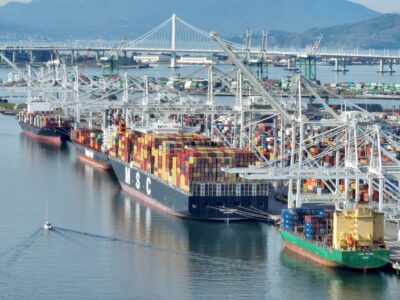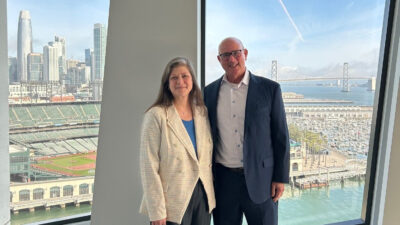The Bay Area Council Government Relations Committee is works at both the state and federal level as the advocacy arm of the Council. Our job is to support the work of the policy committees and ensure that the positions we take as an organization are voiced at the local, state and federal levels.
2024 Goals
- The Council will step into a more significant regional convener role at the state level from both a political and a policy standpoint, activating and leveraging the Bay Area Caucus as well as driving major policy proposals.
- With significant member focus and activity in Sacramento on a variety of bills and regulatory proceedings, the Council will position itself as an “on the ground” advocacy asset for membership alongside Sacramento assets members currently work with.
- Continue to be effective advocates for members with divided government returning to Washington D.C.
- Bring state and federal representatives and their staff aboard the Klamath to build connections between legislators and members.
State Ballot Measures
Proposition 2, School Facilities/Education Bond (Support/Passed)
Voters last approved a school infrastructure bond in 2016 and the funding has been exhausted. Prop. 2 would authorize $10 billion in general revenue bonds for school infrastructure, including $4 billion for the modernization of schools, $3 billion for construction of new schools, $1.5 billion for community colleges, $600 million for charter schools, and $600 million for career technical education programs.
Proposition 3, Constitutional Right to Marriage (Support/Passed)
The federal courts have said that same-sex couples can marry, but outdated language in the California Constitution still says that marriage can only be between a man and a woman. Prop. 3 updates the Constitution to match what the federal courts have said about who can marry.
Proposition 4, Climate Bond (Support/Passed)
Prop. 4 would authorize $10 billion in new bonds to address impacts of climate change, including $3.8 billion for safe drinking water, drought, flood, and water resilience programs, $1.5 billion for wildfire and forest resilience programs, $1.2 billion for coastal resilience programs, $1.2 billion for biodiversity protection, $850 million for clean air programs, $700 million for park creation and outdoor access programs, $450 million for extreme heat mitigation programs, and $300 million for climate-smart, sustainable, and resilient farms, ranches, and working lands.
Proposition 5, Lower Voter Approval for Housing and Infrastructure Bonds (Support/Failed)
Currently, most local bond proposals require a two-thirds vote for approval. Prop. 5 would lower the threshold to 55% for bonds supporting low-income housing, road and transit expansions, parks, wildfire resilience and other public infrastructure projects.
Proposition 32, Minimum Wage Increase (Oppose/Failed)
Prop. 32 would raise the minimum wage to $17 from the current $15 for the remainder of 2024, and $18 an hour starting in January 2025. Small businesses with 25 or fewer employees would be required to start paying at least $17 next year, and $18 in 2026. California already has the second-highest minimum wage in the country.
Proposition 33, Rent Control Expansion (Oppose;Failed)
The Costa-Hawkins Rental Housing Act of 1995 prevents local government from limiting the initial rate that landlords may charge new tenants and prevents local governments from limiting rent increases on existing tenants. Prop. 33 would repeal the Costa-Hawkins Act and would prohibit the state from limiting local governments from enacting rent control ordinances.
Proposition 34, Prescription Drug Spending Restriction (Support/Passed)
Prop. 34 would permanently allow California’s Medicaid program to pay pharmacies directly for prescription drugs. It would also require certain healthcare providers to spend 98% of federal prescription drug funding they receive directly on patient care instead of other purposes.
Proposition 35, Permanent Funding for Medi-Cal Health Care Services (Support/Passed)
Prop. 35 would make permanent a tax on managed health care insurance plans that was agreed to in 2023 and would prohibit using any of the revenue to avoid budget cuts to other programs.
Proposition 36, Increase Penalties for Theft and Drug Trafficking (Support/Passed)
Prop. 36 would increase penalties for some drug and theft crimes by partially rolling back changes in Proposition 47, which voters approved in 2014 reducing penalties.
City of Berkeley
Measure GG (Oppose/Failed)
Would impose a new tax on natural gas usage in buildings larger than 15,000 square feet that would result in a 300% increase in energy costs.
City of Healdsburg
Measure O (Support/Failed)
Would exempt multi-family housing along certain portions of the Healdsburg Avenue corridor from the Growth Management Ordinance to encourage more density in transit served areas.
San Francisco
Prop B (Support/Passed)
Authorizes a $390 billion bond measure to repair and expand hospitals, healthcare facilities, homeless shelters and associated infrastructure and public spaces.
Prop F (Support/Passed)
Would allow full duty patrol SFPD officers to continue to work for the Police Department after retirement while deferring retirement benefits, helping alleviate the loss of experienced officers and maintain staffing levels.
Prop L (Oppose/Passed)
This measure would levy an additional gross receipts tax on all revenue that ride-hail platforms and self-driving car ride services make within the city. The tax would start at 1% and go up to 4.5%.
Prop M (Neutral/Passed)
This measure would make changes to various San Francisco business taxes.
Government Relations Committee Co-Chairs
Kristina Lawson, Managing Partner, Hanson Bridgett LLP
Rebecca Prozan, Head, West Coast Region, Government Affairs and Public Policy, Google







